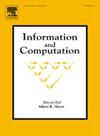LTL的简洁性问题以及LTL的安全性和共安全性片段
IF 1
4区 计算机科学
Q3 COMPUTER SCIENCE, THEORY & METHODS
引用次数: 0
摘要
有限迹上线性时间逻辑(LTLf)已被证明是形式验证和人工智能中重要而有效的形式体系。纯过去LTLf (pLTL)是LTLf的变体,只具有过去的时间模态,并且在有限轨迹的末尾自然地被解释。众所周知,ltf中可定义的每个属性在pLTL中也是可定义的,反之亦然(它们在表达上是等价的)。与G(pLTL)和F(pLTL)公式相比,线性时间逻辑无限轨迹(LTL)的安全和共安全片段也同样如此,即pLTL公式以全局和最终模态为前缀。然而,尽管它们在实践中被广泛使用,据我们所知,还没有系统的研究它们的简洁性。此外,当考虑缺乏二元时间模态的LTL的(co)安全片段时,没有基于pLTL的已知特征。在本文中,我们研究了LTLf和LTL的(co)安全片段与它们的纯过去对应的简洁性问题。首先,我们提供了LTL (co)安全片段的纯过去表征,没有二元时间模态。然后,我们证明了LTL的(co)安全片段具有纯粹的过去副本,可以以指数方式更简洁。最后,我们证明了LTLf相对于pLTL也是如此,反之亦然:LTLf和pLTL在简洁性方面是不可比较的。本文章由计算机程序翻译,如有差异,请以英文原文为准。
Succinctness issues for LTLf and safety and cosafety fragments of LTL
Linear Temporal Logic over finite traces (LTLf) has proved itself to be an important and effective formalism in formal verification as well as in artificial intelligence. Pure past LTLf (pLTL) is the variant of LTLf featuring only past temporal modalities, and is naturally interpreted at the end of a finite trace. It is known that each property definable in LTLf is also definable in pLTL, and vice versa (they are expressively equivalent). The same goes for the safety and cosafety fragments of Linear Temporal Logic over infinite traces (LTL), when compared to G(pLTL) and F(pLTL) formulas, respectively, that is, pLTL formulas prefixed by a globally and an eventually modality. However, despite being extensively used in practice, to the best of our knowledge, there is no systematic study of their succinctness. Moreover, when considering (co)safety fragments of LTL devoid of binary temporal modalities, there are no known characterizations based on pLTL.
In this paper, we investigate succinctness issues for LTLf and (co)safety fragments of LTL when compared with their pure past counterparts. First, we provide a pure past characterization of the (co)safety fragments of devoid of binary temporal modalities. Then, we prove that the (co)safety fragments of have pure past counterparts that can be exponentially more succinct. Finally, we show that the same holds for with respect to , and viceversa: and are incomparable when succinctness is concerned.
求助全文
通过发布文献求助,成功后即可免费获取论文全文。
去求助
来源期刊

Information and Computation
工程技术-计算机:理论方法
CiteScore
2.30
自引率
0.00%
发文量
119
审稿时长
140 days
期刊介绍:
Information and Computation welcomes original papers in all areas of theoretical computer science and computational applications of information theory. Survey articles of exceptional quality will also be considered. Particularly welcome are papers contributing new results in active theoretical areas such as
-Biological computation and computational biology-
Computational complexity-
Computer theorem-proving-
Concurrency and distributed process theory-
Cryptographic theory-
Data base theory-
Decision problems in logic-
Design and analysis of algorithms-
Discrete optimization and mathematical programming-
Inductive inference and learning theory-
Logic & constraint programming-
Program verification & model checking-
Probabilistic & Quantum computation-
Semantics of programming languages-
Symbolic computation, lambda calculus, and rewriting systems-
Types and typechecking
 求助内容:
求助内容: 应助结果提醒方式:
应助结果提醒方式:


